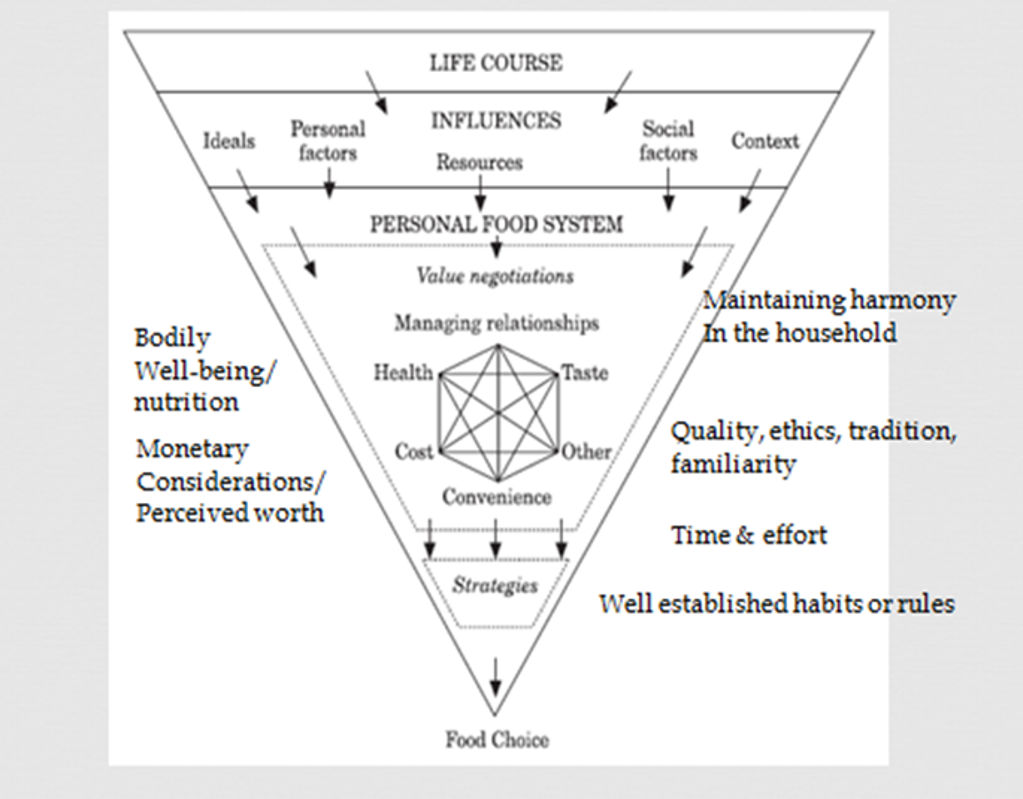Why we choose the foods we eat
Why we choose the foods we eat
When you decide to eat food, your choices are not always as they seem. For example, your life experiences influence food decisions that include your ideals, personal factors, resources, social contexts and food context such as, traditions, associations, budget or availability. The secret then is to balance your food systems and combine it with a nutritionally balanced diet (Furst, Connors, Bisogni, Sobal & Falk, 1996).
When you understand your diet and eating habits you will also see other patterns and factors that affect what you choose to eat each day. Knowing what these factors are, helps you easily control how much they influence your food choices and is the first step in changing poor and unhealthy habits. Below is a list of factors that help you decide what to eat. How do they influence your food choice?
A study by Connors and colleagues (2001) researched food choice decisions. They examined the way people managed food values in selecting food choices in varied contexts.
The Food Choice Process Model
Figure 1: Food Choice Process Model adapted by Connors et al, (2001) From Furst et al (1996)
(Furst, Connors, Bisogni, Sobal & Falk, 1996).
These values considered taste, cost, convenience, health, quality, managing relationships, ethics, tradition, familiarity and the strategies (well established habits and rules) that are used to navigate food choices.
Below are 6 examples of factors that affect food decisions.
Socialising. When eating out, in someone else’s home or when someone else cooks for you, it is much harder to control what you eat. Also, many social meals offer entrees, big meals, and desserts that are high in fat. And It’s hard to say, “No thanks!” to food when there are no other choices. Furthermore, we don’t want our friends and family to think that we are ungrateful or don’t like the food they are offering.
You don’t want to be left out and want to “join in the fun” this is the time it can be easy to persuade you in having another drink, having some ice-cream or trying a piece of chocolate cake.
Budget. How much money you have can also affect your nutritional choices. How many times have you eaten a pie at a bakery, or a McDonalds cheese burger to avoid spending more than a few dollars? The food you buy cheaply are probably less than healthy.
Ethnicity. Depending upon your cultural background, your ethnicity can influence the foods you eat. For example, some cultures eat healthier foods than others. So, it’s a good idea to revisit the nutritional value of some of the ingredients in these meals. Now I am not saying not to have these foods in moderation or on occasion however, if these meals are something you cook once or twice a week, then you might want to slightly change your recipes to keep the taste but cut the fat, sugar and salt, without giving up your culture’s signature dish.
Emotions: Do you eat when you’re happy, or to reward yourself for success? Do you eat when you are sad or depressed? Do you use food to make yourself feel better? Does food replace something that you think may be missing from your life? These are such hard questions that require some soul searching as you might not even realise you do this. However, if you can answer them honestly it may lead you to some Ha-ah moments. For example, many people overeat or turn to sugary snacks when they feel happy or sad. Others stop eating altogether, depriving their bodies of essential nutrients.
Habits. Eating between meals can become a habit when you are not even hungry. For example, eating snacks whilst watching tv, sitting at the computer, listening to music, or driving. You may find yourself eating whilst you talk on the telephone or studying. You may eat when you are feeling bored. I know people that eat lunch because it is 12pm (not because they are hungry). These eating habits can be hard to break. Work schedules can also affect the amount and kinds of foods we eat as well.
Physical Health. What we eat often depends on our physical health. Think about when you are sick, it is normal for our appetite to decrease and to eat less. Like when you have a runny nose or sore throat. Sometimes, an unusually small or large appetite that persists can indicate a health condition that should be treated. If you notice odd changes in your appetite, talk to your doctor.
Would you like to analyse your personal food system by identifying what determines your food choice decisions? You can find the attached worksheet here.
Here you will identify your food choices to:
Taste, cost, convenience, health, quality, managing relationships, ethics, tradition and familiarity, and the strategies (well established habits or rules) used to navigate your everyday food choices.
Educational Nutritional Information like this can be found in a hub in my 12 week Nutrition Program.
It was to designed to help people build a healthy relationship with food and their body. Enrollments are filling. You can find out all about it here: Just click this link
But, if you still unsure, really interested and have any questions, you can find me on email just send me a message.
References:
Connors, M., Bisogni, C. A., Sobal, J., & Devine, C. M. (2001). Managing values in personal food systems. Appetite, 36, 189-200.
Furst, T., Connors, M., Bsogni, C. A., Sobal, J., & Falk, L. N. (1996). Food choice: A conceptual model of the process. Appetite, 26, 247-266.









